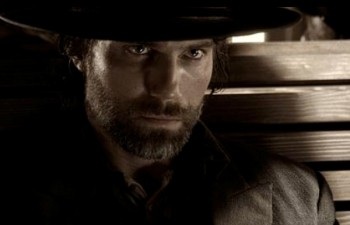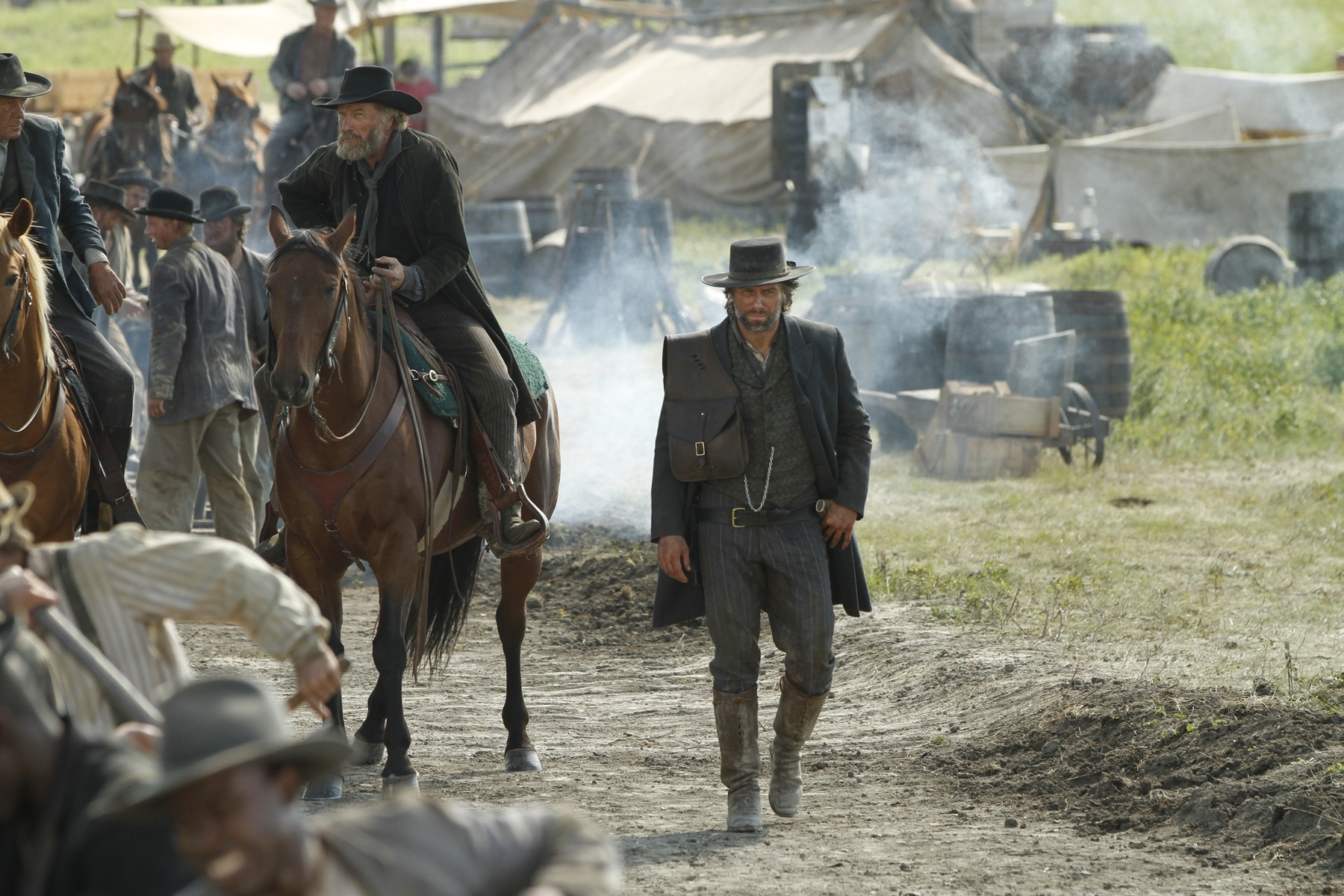 It seems to me that everyone was going into tonight’s premiere of the new period drama show Hell on Wheels with the mindset that this will be AMC’s first subpar original series. I’m not entirely sure from what exactly this theory derives. The subject matter is hardly grounds for dismissal of the show—yes, a lot of period dramas are being attempted these days, but very few before the 1900s; thus, a lack of originality is not necessarily a factor. Aside from the inclusion of rapper Common as a liberated slave and railroad laborer, the casting should not lend any particular degree of skepticism. So why, exactly, were we all—myself included—setting ourselves up to be underwhelmed? Whatever the answer is, it’s unfair to approach any show—or anything at all—with that attitude. But considering, Hell on Wheels did all right by me. No, it wasn’t anything monumentally gripping—few pilots really are, to be fair. I didn’t find myself drawn to any particular character or storyline (although the pair of Irishmen traveling together did offer some fun comic relief, for which I’m a sucker—and, don’t ask me why, I do love Ted Levine in any role, though we won’t be seeing him around the railroad in any future episodes). But, as said, considering the public negativity it was facing, Hell on Wheels delivered a pretty viable premiere episode.
It seems to me that everyone was going into tonight’s premiere of the new period drama show Hell on Wheels with the mindset that this will be AMC’s first subpar original series. I’m not entirely sure from what exactly this theory derives. The subject matter is hardly grounds for dismissal of the show—yes, a lot of period dramas are being attempted these days, but very few before the 1900s; thus, a lack of originality is not necessarily a factor. Aside from the inclusion of rapper Common as a liberated slave and railroad laborer, the casting should not lend any particular degree of skepticism. So why, exactly, were we all—myself included—setting ourselves up to be underwhelmed? Whatever the answer is, it’s unfair to approach any show—or anything at all—with that attitude. But considering, Hell on Wheels did all right by me. No, it wasn’t anything monumentally gripping—few pilots really are, to be fair. I didn’t find myself drawn to any particular character or storyline (although the pair of Irishmen traveling together did offer some fun comic relief, for which I’m a sucker—and, don’t ask me why, I do love Ted Levine in any role, though we won’t be seeing him around the railroad in any future episodes). But, as said, considering the public negativity it was facing, Hell on Wheels delivered a pretty viable premiere episode.
The central story revolves around Cullen Bohannen (Anson Mount), veteran of the Confederate Army in the Civil War who is on a mission to avenge the death of his wife. The first we meet of Bohannen, he is hiding out in a confession booth, ready to ambush and kill one of the men he knows to be responsible for her death. What he believes at this point is that she committed suicide due to the atrocities imparted on her by these men—Union soldiers. The truth: she was murdered, and made to look like a victim of suicide, by the men of whom he is aware and an unnamed senator. While Bohannen paints himself as a godless murderer and former slave owner, we like him straight from the start. We learn that he freed his slaves due to a moral enlightenment (courtesy of his wife) a year before the Civil War, but still fought in his army out of honor. We understand that he has a greater human respect for the black men who work on the railroad than do Levine’s character and any of the other nameless men we meet. He has a thick black beard and speaks in a sullen whisper, but we like him. He’s rhythmic, he’s crafty, he says what he means, he’s tortured by his driving ambition of revenge…Cullen is your typical antihero. And though he’s nothing we haven’t seen much of before, he’s played quite well by Mount, so we find him more likable than not.
We don’t learn too much about any of the other characters. Elam (Common) is the self-appointed “leader” of the black laborers, speaking for their injustices and often taking matters into his own hands. He kills the tyrannical railroad manager played by Levine—much to the chagrin of Cullen, who was hoping that Levine’s character would supply him with the name of the senator who killed his wife—at the end of the episode in his own act of vengeance of the violence imparted upon his friend and coworker. There are also a pair of so-affably-in-love-that-you-know-one-is-about-to-die travelers, who brave hostile American Indian territory and feel the wrath of a violent tribe. The man dies, and the woman is left injured and alone—where exactly they’ll take this story is beyond me, because two revenge pieces in one series is far too many.

And finally, there is the head of the railroad business, Thomas ‘Doc’ Durant (Colm Meaney), who professes vociferously his Gordon Gekko attitude throughout the episode, summing his accepted villainy all up in a reasonably meta speech at the end: his wickedness is necessary for the success of this business. AMC does love its villains, and Doc might be a good one. He’s not blind to his flaws, or even ashamed of them. He understands that his motivations are purely selfish. But, in quite the Machiavellian sense, he also understands that they serve a useful purpose for the progress of the United States. Sure, he might not particularly care about this—or he might, we’ll have to explore him further—but such is the case.
One thing I will say about Hell on Wheels, it is more fun than I thought it would be. It’s faster and more stylistic. Not to lessen its originality—the style is most definitely its own—but it did seem reminiscent of something in the Tarantino vein at times, especially in Cullen’s opening shoot-a-man-in-a-church-confessional scene. The dialogue lies in the healthiest compromise between modern and of-the-times, never incomprehensible and not offensively anachronistic. Like the mood, it is far more fun and rhythmic than I expected the series would be. As are many of the characters—I’m really looking forward to seeing more of those two bizarre Irish fellows.
But the real show will rely on Cullen and Doc, and, (I believe) to a lesser extent, Elam. Cullen’s revenge story will be the narrative that keeps us going. The problem with this is, they need to really make us care about Cullen’s late wife and why her killer must be brought to justice. They have lain the groundwork as amply as a pilot can—not only was she his love, she was the good inside of Cullen. She brought him to free his slaves, and made him the honorable man we have met. That’s reason enough for now, but they’d better do some regular reinforcing. As far as Doc goes, as long as he amps up the evil every so often and keeps his dictums going, I don’t doubt that he’ll maintain interest.
In short, the pilot is a pleasant surprise. I can’t commit to the idea that this will be a can’t-miss. But it does have the potential to be a should-probably-keep-up-with. It is AMC, after all.
Hell on Wheels airs Sunday nights at 10 p.m. ET/PT on AMC.


